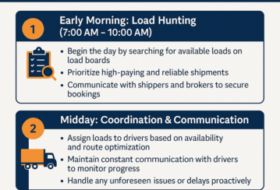Starting a box truck business can be a rewarding venture for aspiring entrepreneurs looking to enter the transportation and logistics industry. Box trucks are versatile vehicles used for various purposes, such as delivery services, moving, and freight transportation. To ensure a successful startup, careful planning, market research, and strategic decision-making are essential. In this article, we will explore the key steps to launch a box truck business and set it on the path to growth and success.
- Conduct Market Research
Before diving into the box truck business, conduct thorough market research to identify potential opportunities and challenges. Analyze the demand for transportation services in your target area, assess the competition, and understand the needs of potential customers. Understanding the market dynamics will help you tailor your services and stand out from the competition. - Develop a Business Plan
A well-crafted business plan is the foundation of any successful startup. Outline your business goals, target market, marketing strategies, pricing structure, financial projections, and operational plans. A comprehensive business plan not only guides your startup journey but also serves as a valuable tool when seeking funding or attracting investors. - Obtain Necessary Permits and Licenses
Operating a box truck business requires compliance with local, state, and federal regulations. Obtain the necessary permits and licenses, such as a commercial driver’s license (CDL), business permits, and any specific permits required for commercial transportation in your area. - Secure Funding
Determine the startup costs for your business, including vehicle acquisition, insurance, marketing expenses, and working capital. Explore funding options, such as personal savings, loans, or seeking investors, to finance your startup. - Choose the Right Box Trucks
Selecting the right box trucks is a critical decision for your business. Consider factors such as payload capacity, fuel efficiency, and maintenance costs. Decide whether you will buy or lease the box trucks based on your financial capacity and long-term business goals. - Develop a Marketing Strategy
Create a marketing plan to promote your box truck business and attract customers. Utilize digital marketing, social media, and networking to build a strong online presence. Partner with local businesses, realtors, and e-commerce companies to secure contracts and regular clients. - Set Competitive Pricing
Determine competitive pricing for your services based on market research, operating costs, and profit margins. Offering competitive rates can help you attract customers and gain a foothold in the market. - Hire and Train Staff
If your box truck business requires additional staff, hire reliable and skilled drivers and support personnel. Provide comprehensive training to your employees, emphasizing safety protocols, customer service, and efficient delivery practices. - Focus on Customer Service
Exceptional customer service is key to building a loyal customer base. Prioritize timely deliveries, clear communication, and responsiveness to customer inquiries and concerns. - Monitor and Adapt
Regularly monitor the performance of your box truck business and seek customer feedback to identify areas for improvement. Be prepared to adapt and adjust your strategies based on market trends and customer needs.
Conclusion
Launching a box truck business requires careful planning, dedication, and a commitment to excellence. By conducting market research, developing a solid business plan, securing necessary permits, and providing outstanding service, you can set the foundation for a successful and thriving box truck business. Continuous monitoring, adaptation, and a focus on customer satisfaction will drive growth and establish your business as a reputable player in the competitive transportation and logistics industry.








